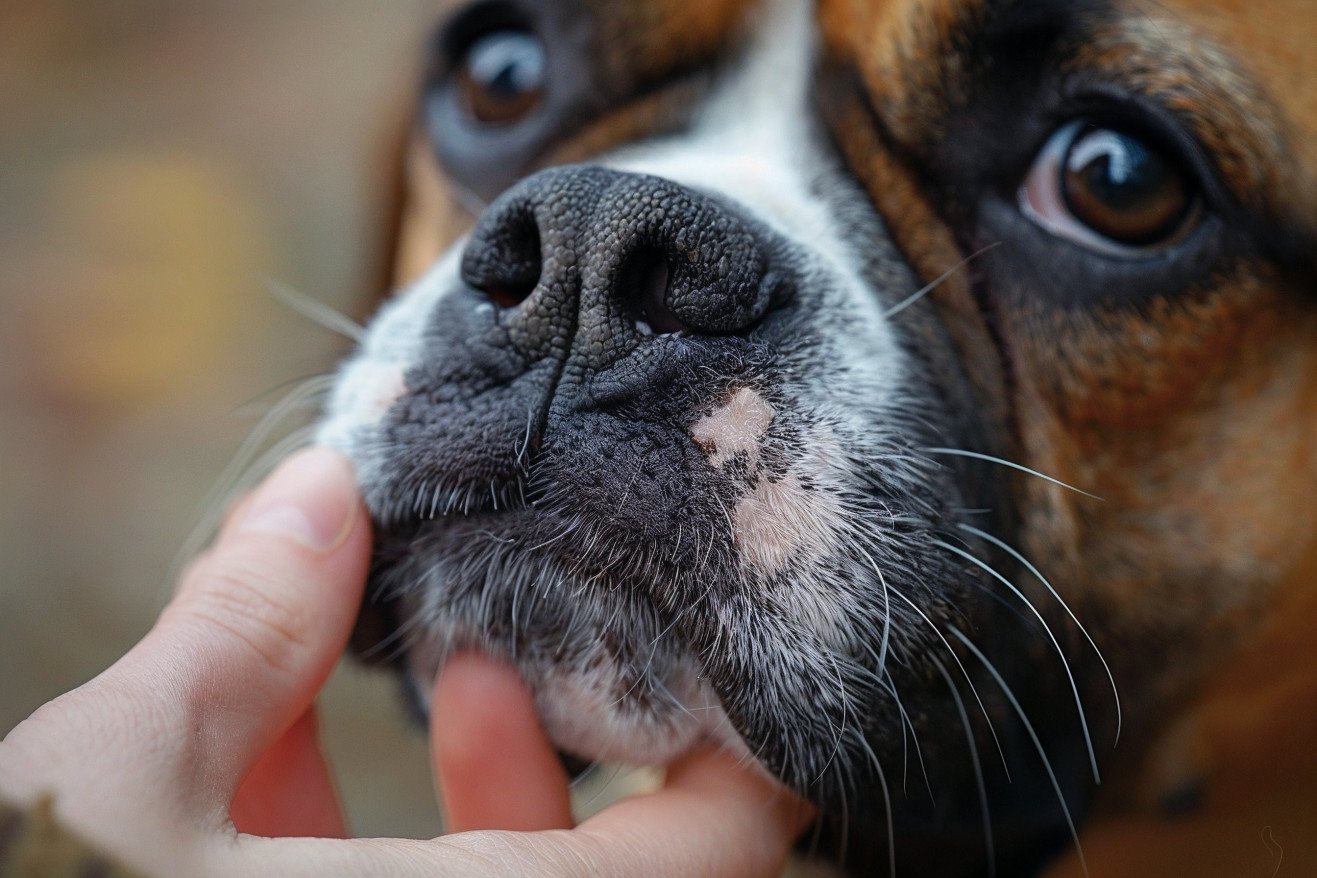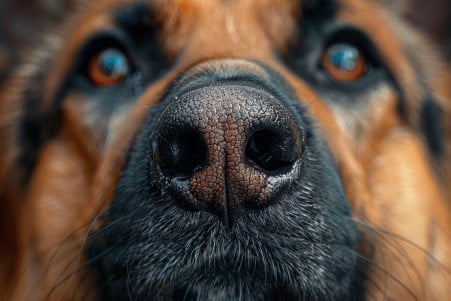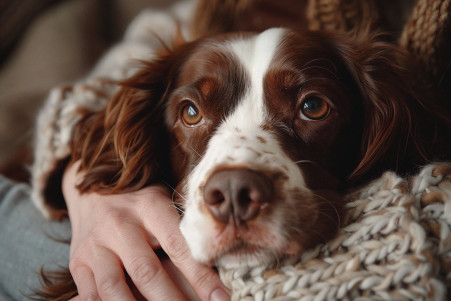Is Your Dog’s Dry Nose a Health Concern? Understanding Canine Nasal Dryness
12 March 2024 • Updated 11 March 2024

Is a dry nose merely a harmless trait or an indication of a more serious condition for your dog? While things like sleep, hydration, or the weather can cause a dog’s nose to dry out, which is often normal.
If a dog’s nose is dry, cracked, or showing other signs of dryness for an extended period of time, it may be a sign of an underlying health issue and a reason to take your dog to the vet.
In this article, we’ll look at a range of scientific and veterinary sources to help you understand the causes of a dog’s dry nose. We’ll cover everything from physiological research to environmental causes and medical conditions.
We’ll also look at ways to prevent and treat a dry nose with input from veterinary experts. By the end of this article, you’ll have a thorough understanding of what a dry nose means for your dog and how to deal with it.
Is your dog's dry nose a health concern?
How a Dog’s Nose Works
The dog’s nose is a wonder of evolution, with a number of sophisticated features that humans can’t match. In terms of anatomy, the dog’s nose is a complicated system that includes external nares and internal nasal cavities that are lined with mucous membranes that help modify the air the dog breathes before it reaches the lungs.
According to WikiVet, the mucous secretions of the nasal cavity warm, humidify, and filter incoming air, a process that is critical to respiration and overall health.
In addition to the above, the moisture on a dog’s nose is important for the dog’s ability to detect scents. As explained in a study published by PMC, the moisture on the surface of the nose helps trap scent molecules, which are then detected by olfactory receptors in the nasal cavity.
In addition, the moisture on the nose helps the dog regulate its body temperature, which is important for dogs since they don’t sweat through their skin like people do.
At times, a dog’s nose may be dry, but this doesn’t necessarily mean that anything is wrong. The moisture level of a dog’s nose can change based on a number of factors, including the dog’s daily routine and the weather.
Knowing what’s normal for a dog’s nose can help you avoid unnecessary worry, but it’s also important to know when a dry nose may be a sign of a problem—this is something we’ll delve into in more detail as we look at the common causes of a dog’s dry nose.
Why Is My Dog’s Nose Dry?
While a wet nose is a sign of good health in dogs, there are many reasons why your dog’s nose might be dry. For example, According to Vetstreet, it’s normal for dogs to have a dry nose when they’re sleeping. They stop licking their noses, which is what keeps them moist, while they’re sleeping, and when they wake up, their noses are dry. In addition, wind and sun can dry out your dog’s nose.
There are also environmental reasons for a dry nose. Vetwest explains that the dry air created by central heating in the winter and air conditioning in the summer can lead to dry noses. In addition, certain breeds, such as Bulldogs and Pugs, which have short noses, may have drier noses because of the shape of their noses.
In addition, a dog’s age and hydration levels can impact the moisture of their nose.
As dogs get older, their skin, including the skin on their nose, tends to get drier.
In addition, if a dog isn’t drinking enough water, they can become dehydrated, and one of the signs of dehydration is a dry nose.
While these factors are important to consider, they often don’t mean that there’s a serious health problem. However, it’s always a good idea to monitor your dog’s overall health, as if their nose is consistently dry and they’re showing other signs of illness, it may be time to take them to the vet.
When to Be Concerned About a Dog’s Dry Nose
While a dry nose in dogs is often nothing to worry about, there are some symptoms that can accompany it that may be cause for concern. According to Dr. Julie Buzby of Dr. Buzby’s ToeGrips for Dogs, if you notice your dog’s nose is dry and also has any of the following symptoms, it’s time to call your vet:
- Cracking
- Bleeding
- Change in color
Dr. Buzby also says that if your dog’s nose is dry and these symptoms are accompanied by nasal discharge, crusting, or peeling, you should call your vet immediately.
It’s important to note that autoimmune diseases like discoid lupus erythematosus and pemphigus, which can cause these symptoms, can only be diagnosed and treated by a vet, according to PetMD. It’s also important to pay attention to your dog’s overall health, as infections or severe allergies can also cause these symptoms.
In addition, if your dog’s dry nose is accompanied by other symptoms like lethargy or a loss of appetite, it could be a sign of a more serious health issue. In this case, it’s important to call your vet if the symptoms don’t go away or get worse.
By taking a proactive approach to your dog’s nose health, you can make sure that you’re not only addressing any immediate issues but also helping to ensure that your dog is as healthy and happy as possible in the long run.
Why It’s Important to Keep Your Dog’s Nose Hydrated
Water is a necessary nutrient for dogs and is important for maintaining their overall health, including the health of their nose. PetMD explains that dehydration in dogs can cause a dry nose, as well as other symptoms like sticky gums and lethargy. Dehydration occurs when a dog’s water loss from panting, urination, and sweating from their paw pads exceeds their water intake.
It’s important to know the signs of dehydration. PetMD explains that signs can include a dry, warm nose, as well as sunken eyes and a lack of energy.
To keep your dog’s nose and body healthy, make sure they always have access to fresh water. An article on PMC explains that a dog’s total water intake affects the moisture of their nasal cavity, so making sure your dog is well-hydrated can help prevent or relieve a dry nose.
Make sure your dog is drinking enough water, especially in hot weather or after exercise. DVM360 recommends using pet-safe water flavoring or adding water to your dog’s food to encourage them to drink more. By making sure your dog is well-hydrated, you can help ensure their nose stays in the best shape possible, which will help them smell better and stay healthy.
How to Keep Your Dog’s Nose Healthy: Nose Care and Protection
It’s important to check your dog’s nose regularly to ensure that you notice any changes in texture and moisture. This will help you catch any potential problems early, and if you do notice that your dog’s nose is dry, Hill’s Pet recommends wiping the nose with a damp, cool cloth and then applying a dog-friendly moisturizer or balm.
In addition to care, protection is also an important part of keeping your dog’s nose healthy. Weddington Animal Hospital explains that a dog’s nose can get sunburned, so it’s important to limit its time in the sun during peak hours and talk to your vet about the best way to use sunscreen to protect your dog’s nose.
A dog’s diet can also help maintain healthy skin. A well-balanced diet that includes omega fatty acids can help keep your dog’s skin healthy and prevent dryness. As NOVA explains, a wet nose is important for a dog’s sense of smell, so it’s important to keep your dog’s nose healthy through care and protection to help maintain their senses.
By following these protective and treatment measures, you can help make sure that your dog’s nose stays healthy, which is a small but important part of helping them live their best life.
Summary of What You Need to Know About Dog Nose Health
Our investigation into dog nose dryness has shown just how complex a dog’s nose is and how important it is to their overall health.
We’ve also shown that while a cold, wet nose is a sign of a healthy dog, there are many other things, like sleep, hydration, and the weather, that can lead to a dry nose, as Dr. Julie Buzby pointed out. Having a consistently wet nose is important for a dog’s sense of smell, as PBS Nova explained, and it also helps them regulate their body temperature.
That said, chronic dryness, especially if it’s accompanied by other symptoms like cracking or discharge, can be a sign of other health problems, including autoimmune diseases like discoid lupus erythematosus. It’s also important to make sure your dog is getting enough water, as PetMD suggested.
In other words, it’s important to know the difference between a dog nose that’s dry because of normal factors and one that’s a sign of a problem. By keeping an eye on your dog’s nose and overall health, you can help make sure your dog’s sense of smell and comfort stay as sharp as possible. The often-forgotten nose is definitely a window into a dog’s health and happiness.


